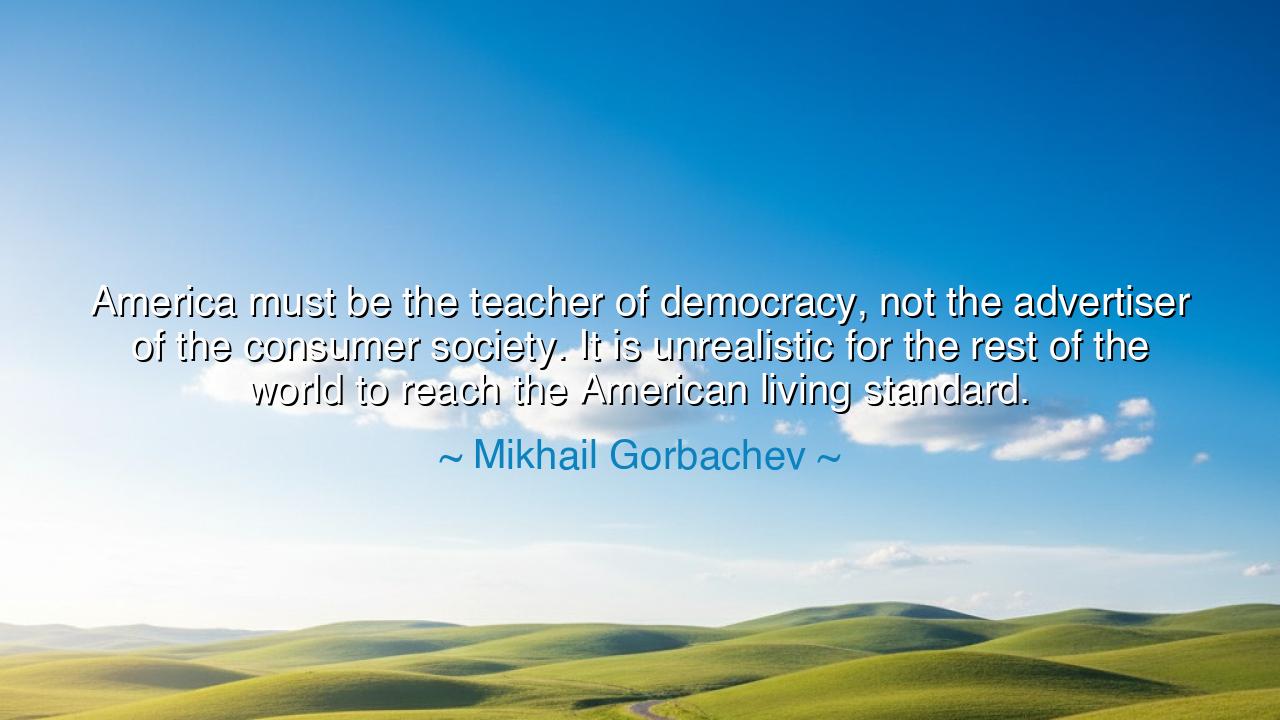
America must be the teacher of democracy, not the advertiser of
America must be the teacher of democracy, not the advertiser of the consumer society. It is unrealistic for the rest of the world to reach the American living standard.






Hear the solemn words of Mikhail Gorbachev, the last leader of the Soviet Union, who saw the world with the eyes of both dreamer and realist: “America must be the teacher of democracy, not the advertiser of the consumer society. It is unrealistic for the rest of the world to reach the American living standard.” These words were born in an age of rivalry and transformation, when East and West contended not only with weapons, but with visions of the future. They remain a warning and a lesson for all time: that the greatness of a nation lies not in its luxuries, but in the principles it shares with the world.
The meaning is clear. To be a teacher of democracy is to embody justice, fairness, and liberty in ways that others may learn and imitate. To be merely an advertiser of the consumer society is to flaunt material wealth without moral grounding, to dazzle with abundance while ignoring the deeper hunger of the human spirit. Gorbachev understood that many nations could never achieve the vast consumption of the American way of life, for the earth itself could not bear such weight. But all nations could aspire to democracy, to dignity, to self-rule. Thus he urged America to lead by wisdom, not by display.
The ancients too saw this difference. Athens, in her glory, was admired not because her citizens feasted on luxuries, but because she gave the world the idea of the polis—the self-governing city where free men debated their destiny. Rome endured not because of her villas and banquets, but because she offered the conquered a share of her laws, her rights, her citizenship. When these ideals weakened, when power turned to indulgence and democracy turned to spectacle, decline followed swiftly. In this Gorbachev’s words echo: a nation that teaches principles may endure; a nation that merely advertises its pleasures invites envy, resentment, and eventual collapse.
Consider the years after the Second World War. America stood as the beacon of hope, championing freedom against tyranny. Her Marshall Plan rebuilt a broken Europe, not merely with dollars, but with the promise of shared prosperity and democracy. In those years, America was the teacher of democracy, and her influence reshaped continents. But in later decades, the world also saw the rise of America as the global advertiser—Hollywood films, fast food chains, luxury brands—symbols of a consumer society paraded as the ultimate measure of success. These exports dazzled, but they also created illusions that many nations could never replicate.
Gorbachev, standing at the twilight of the Soviet Union, saw the danger. He knew that for poorer nations, chasing the American living standard was like chasing a mirage across the desert. The more they pursued, the further it retreated, leaving frustration, division, and dependence in its wake. Yet the pursuit of democracy—though difficult—was possible for all, because it relied not on endless consumption, but on justice, responsibility, and shared power. His words were thus a call to America: to choose what kind of leader it would be to the world—an advertiser of materialism, or a teacher of liberty.
The lesson for us is profound. A nation, like a person, must decide what it offers to others. Do we flaunt our wealth, tempting others into envy and despair? Or do we share our wisdom, guiding others toward dignity and self-rule? The first path is shallow, the second is enduring. Just as a teacher shapes generations, so too does a nation that leads by principle shape the destiny of the world. The consumer society dazzles for a season, but democracy, if well-taught and lived, is a gift that lasts beyond centuries.
What, then, must we do? As citizens, let us value principles above possessions, and freedom above luxury. Let us measure our lives not by what we consume, but by what we contribute. As nations, let us offer the world not advertisements of abundance, but examples of fairness, justice, and compassion. And let us remember that the earth cannot sustain infinite consumption, but it can sustain infinite dignity if we build societies on truth and shared responsibility.
Thus remember: the teacher of democracy is remembered with gratitude, but the advertiser of the consumer society is soon forgotten. Gorbachev’s words are a torch passed to every generation: let us choose to lead by justice, not by indulgence, and to build a world where the measure of greatness is not what we have, but what we give.






AAdministratorAdministrator
Welcome, honored guests. Please leave a comment, we will respond soon